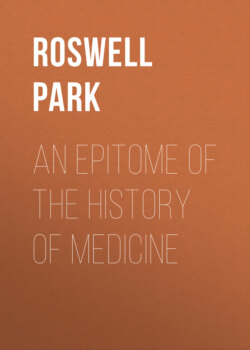Читать книгу An Epitome of the History of Medicine - Roswell Park - Страница 11
На сайте Литреса книга снята с продажи.
Original
ОглавлениеCornelius Celsus, the most celebrated author for a number of centuries, was born in Rome about the time of Christ. Brilliant as he was, he exerted a wide-spread influence for centuries. The exact date of his death is unknown. He was a contemporary of the greatest philosophers, poets, and savants of Rome during its most brilliant period. He studied rhetoric, philosophy, the art of war, economics, and medicine—he was, in fact, a walking encyclopaedia of the knowledge of his day; but it is in medicine that he shows to best advantage, and in his capacity as a physician he was and is best known. The direction in which Celsus appears to least advantage is in failure of power of direct observation, and in yielding unquestioning obedience to the views and dicta of Hippocrates, for whom he possessed the greatest reverence, not being able to brook any serious contradiction or opposition to his opinions. In this reverence for Hippocratic authority he was followed by many less prominent successors, the consequence being a failure to train men as observers, the endeavor being to make them simply storehouses of information derived from Hippocratic writings. As a result, Celsus wrote but little, or else his writings are lost. He contented himself mostly with a mere commentary upon the writings which he so highly revered. But little of his writings remain, and these pertain mostly to the therapeutics of curable disease, dietetic, pharmaceutical, and surgical. Although he exercised great authority during his period, he was later totally supplanted by Galen, and his views are seldom mentioned in the writings of those subsequent to this great physician. His death must have taken place during the first century after Christ.
Of all the students of Hippocratic dogmatism, the most earnest, skillful, and learned was Claudius Galen, a native of Pergamos, a place already celebrated for its temple dedicated to Æsculapius, for its school of medicine, and for a library which had been removed to Alexandria. He was placed by his father under the most distinguished teachers in all of the sciences, and even as a young man showed extraordinary progress, and became early a disputant with the most erudite in grammar, history, mathematics, and philosophy. He has related how in two different dreams he was urged by Apollo to study medicine. He traveled widely for instruction, and remained some time in Alexandria.
